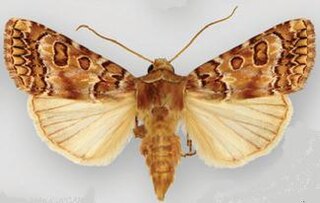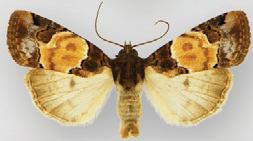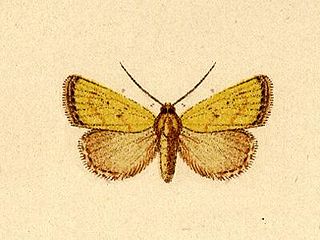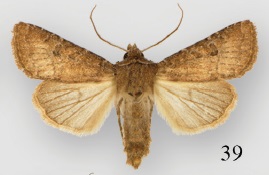
Hypotrix is a genus of moths of the family Noctuidae.

Marimatha is a genus of moths of the family Noctuidae. The genus was erected by Francis Walker in 1866.

Acontia areletta is a moth of the family Noctuidae. The species was first described by Harrison Gray Dyar Jr. in 1907. It is found in Mexico.

Hypotrix ferricola is a moth of the family Noctuidae first described by Smith in 1905. It is found in southern North America from south-eastern Arizona, south-western New Mexico and northern Mexico.

Hypotrix diplogramma is a moth of the family Noctuidae first described by William Schaus in 1903. It is found in southern North America from eastern Arizona and south-western New Mexico southward at least to Mexico City.

Hypotrix ocularis is a moth of the family Noctuidae. It is found from south-western New Mexico and south-eastern Arizona southward to Mexico City.

Hypotrix basistriga is a moth of the family Noctuidae. It is known only from the White Mountains and Pinaleño Mountains in eastern Arizona.

Hypotrix hueco is a moth of the family Noctuidae first described by William Barnes in 1904. It is known only from south-eastern Arizona in the United States.
Marimatha squala is a moth of the family Noctuidae first described by Clifford D. Ferris and J. Donald Lafontaine in 2010. It is found from Arizona, southward to Costa Rica.
Marimatha quadrata is a moth of the family Noctuidae first described by Clifford D. Ferris and J. Donald Lafontaine in 2010. It is found from western Texas and Arizona and southward to southern Mexico (Sinaloa).

Marimatha piscimala is a moth of the family Noctuidae first described by Clifford D. Ferris and J. Donald Lafontaine in 2010. It is found from south-eastern Texas to Arizona southward to Panama.
Marimatha tripuncta is a moth of the family Noctuidae first described by Heinrich Benno Möschler in 1890. It is found in the Caribbean and southern Florida.

Bryolymnia mixta is a moth of the family Noctuidae first described by Donald Lafontaine and J. Walsh in 2010. It is known only from the Patagonia Mountains in south-eastern Arizona.

Bryolymnia biformata is a moth of the family Noctuidae first described by Donald Lafontaine and J. Walsh in 2010. It is known only from the Huachuca, Patagonia, and Santa Rita Mountains in south-eastern Arizona.

Bryolymnia anthracitaria is a moth of the family Noctuidae first described by Clifford D. Ferris and Noel McFarland in 2007. It is known only from south-eastern Arizona where it has been collected in oak scrub grassland.

Marimatha aurifera is a moth of the family Noctuidae first described by Francis Walker in 1858. It is found in Brazil, and other countries in South America. The species has been listed erroneously as occurring in the Caribbean and in North America.

Protorthodes ustulata is a moth in the family Noctuidae first described by J. Donald Lafontaine, J. Bruce Walsh and Clifford D. Ferris in 2014. It is found in North America from south-eastern Wyoming southward to the Guadalupe Mountains in western Texas and westward to central and south-eastern Arizona and northern Mexico.

Nudorthodes is a genus of moths of the family Noctuidae erected by J. Donald Lafontaine, J. Bruce Walsh and Clifford D. Ferris in 2014.

Nudorthodes molino is a moth in the family Noctuidae first described by J. Donald Lafontaine, J. Bruce Walsh and Clifford D. Ferris in 2014. It is found in the western US in southeastern Arizona and southwestern New Mexico.
Homorthodes dubia is a species of cutworm or dart moth in the family Noctuidae. It was described by William Barnes and James Halliday McDunnough in 1912 and is found in North America.







